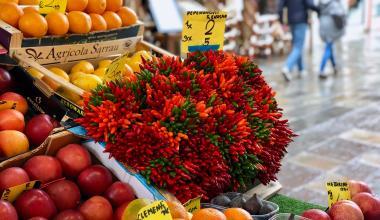A survey of pesticide use in India, Bangladesh, Vietnam and Laos released by PAN Asia Pacific (PANAP) reveals that the majority of pesticides being used in selected farming communities are considered Highly Hazardous Pesticides (HHPs) or banned in one or more countries.
Check out the full press release here!
PANAP released the report in time for the resumed Fourth Meeting of the Inter-sessional Process for the Strategic Approach on International Chemicals Management (SAICM IP4.2) in Nairobi, underscoring the need for urgent action on a global phase-out of HHPs.
In a report entitled Field Survey: Use and impacts of pesticides in four countries in Asia, it was found that out of 36 pesticides used, 27 or 75% were HHPs[1] or pesticides that cause the most harm to human health and the environment.
HHPs were 100% of the pesticides being used in Laos, 92% in Bangladesh and India, and 60% in Vietnam.
Out of the 36 pesticides used, 29 or 81% were banned in one or more countries, with 25 or 69% banned in the European Union.[2] Farmers used at least seven EU-banned pesticides[3] manufactured and sold by EU-based corporations Syngenta, Bayer and BASF, exemplifying ‘double standards’ in the pesticide trade.
The survey with 367 respondents also revealed conditions of use that cause serious health and environmental harm:
- The most common way farmers were getting exposed to pesticides was when they were conducting ground spraying (73%) using backpack sprayers.
- Majority of the surveyed farmers (74%) were not trained on pesticide use, with the problem worse for women (84%).
- Farmers in all four countries reported not using PPE during pesticide application, with Bangladesh reporting the highest proportion of non-use (99% of surveyed farmers). The main reasons given for not wearing correct PPE were that it is unaffordable, uncomfortable or unavailable.
- More than one-third of women (37%) and men (37%) farmers showed symptoms of illness after pesticide exposure, with dizziness, headache, excessive sweating, vomiting, blurred vision and skin rashes as the most common symptoms reported.
Among the report’s recommendations are the following:
- Immediate action be taken by governments of countries with hot climates and small-scale users to comply with Article 3.6 of the International Code of Conduct on Pesticide Management and ban pesticides that require PPE
- Immediate action be taken by the pesticide industry to cease the import and sales of pesticides that require PPE in countries where small-scale farmers have access to them
- Countries cease the export and import of pesticides that have been banned in their country of origin for health and/or environmental reasons (‘double standards trade’)
PANAP added that the upcoming International Conference of Chemicals Management this September presents an opportunity for concerted global action to phase out HHPs. PANAP is supporting a proposal for a Global Alliance on HHPs, a voluntary, collaborative and multi-stakeholder initiative under the new SAICM/Beyond 2020 instrument proposed by the African Region.
"We call on global policymakers to set bold targets to eliminate Highly Hazardous Pesticides in agriculture, prohibit double standards in pesticides trade, and make available to all farmers information on non-chemical alternatives, especially ecological approaches, by 2030. The intersecting crises of food, climate and biodiversity cannot be solved if we do not put clear limits on chemical farming and the control that agrochemical transnationals have over our food systems,” said Sarojeni Rengam, PANAP executive director.
________________________
[1] PAN International. 2022. Consolidated List of Banned Pesticides.
[2] Banned or specifically ‘not approved’ pesticides in EU which are Highly Hazardous Pesticides and/or banned by another country. For more information, see Explanatory Note.
[3] Propiconazole (Brand name: Tilt Super 300 EC/Syngenta); Hexaconazole (Brand name: Anvil 5SC/Syngenta); Thiamethoxam (Brand name: Virtako/Syngenta); Diafenthiuron (Brand name: Polo/Syngenta); Quinalphos (Brand name: Ekalux/Syngenta); Fipronil (Brand name: Regent/BASF); Imidacloprid (Super Confidor/Bayer)
[4] FAO and WHO. 2019. Detoxifying agriculture and health from highly hazardous pesticides—a call for action.


